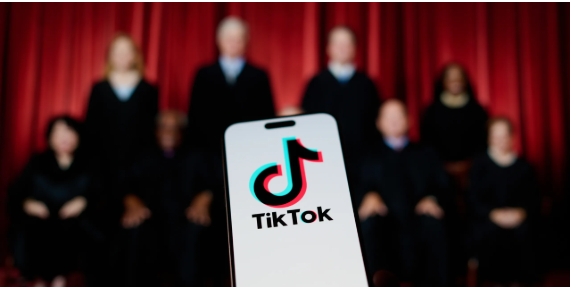TikTok Banned: Supreme Court Upholds Law, What’s Next? In a landmark decision, the U.S. Supreme Court upheld a law that could ban TikTok in the U.S. It takes effect on January 19, 2025. This has sparked debate and concern among millions of TikTok users.
This blog post will explore the Supreme Court’s ruling. We’ll cover the arguments and what it means for TikTok and U.S. social media.
The Supreme Court’s decision
TikTok Banned: Supreme Court Upholds Law, What’s Next? On January 17, 2025, the Supreme Court upheld a bipartisan law. It requires TikTok’s China-based parent, ByteDance, to sell the app or face a ban. The court rejected TikTok’s free speech challenge. It said national security concerns outweigh the impact on free speech.
The Protecting Americans from Foreign Adversary Controlled Applications Act requires ByteDance to sell its U.S. assets by January 19, 2025. If not, authorities will ban the app.
Also read:UFC 311

The Rise of TikTok and National Security Concerns
TikTok is a short-form video app. Its engaging content and addictive algorithm have captivated millions of users worldwide. Yet, this meteoric rise has also raised concerns about national security.
- Critics say TikTok, owned by China’s ByteDance, is a security threat. They have concerns about its data collection practices. There are concerns that the Chinese government may access user data. This includes sensitive information like location data, browsing history, and biometric data. You could use this data for espionage, surveillance, or to influence public opinion.
- Concerns exist that TikTok could spread disinformation and propaganda. This could influence U.S. elections and public discourse. The platform’s algorithm can personalize content feeds. It may expose users to biased or manipulative information.
- Technological Dependence: TikTok’s popularity raises concerns about reliance on a foreign-owned app. A ban could limit the influence of Chinese technology companies in the U.S. market.
The Legal and Constitutional Landscape
The potential ban of TikTok faces significant legal and constitutional challenges.
- First Amendment rights: A TikTok ban could violate free speech rights. The Supreme Court must weigh whether a social media ban violates free speech rights.
- Executive Authority: We must carefully examine the legal basis for a potential ban. The executive branch must show a strong national security need to justify such a drastic measure.
- A U.S. ban on TikTok could damage U.S.-China relations. It might set a precedent for similar actions against other foreign tech firms.
Implications of a TikTok ban
A ban on TikTok would have significant implications for:
- Users: Millions of Americans would lose access to a popular social media platform. It would harm their social connections, entertainment, and access to information.
- Creators: TikTok has allowed many creators to build careers and audiences. A ban would disrupt their livelihoods and could hinder their ability to be creative.
- The Technology Industry: A TikTok ban could set a precedent. It may restrict other foreign-owned tech firms. That would hurt U.S. tech innovation and competition.
- International Relations: A ban could worsen U.S.-China relations and raise tensions.
The Future of TikTok in the United States
The future of TikTok in the United States remains uncertain. While a complete ban remains a possibility, alternative solutions are also being explored.
- Data Security Measures: One solution is to implement stricter data security measures to address national security concerns. This could include limits on data collection, sharing with the Chinese government, and better data security.
- US-Based Ownership: Another option could be to force ByteDance to sell TikTok. It would involve a US company buying the US operations. This would address concerns about foreign ownership and data security.
- Negotiated Agreements: The U.S. government could negotiate with China. This would address data security concerns and protect U.S. user data.
Key Arguments and Rationale
The Justice Department argued that TikTok’s data collection poses a risk. TikTok Banned: Supreme Court Upholds Law, What’s Next? Its ties to the Chinese government are a concern. They claimed the Chinese government could control what users see. It could also collect sensitive data on millions of Americans.
TikTok’s lawyers said the ban would impose significant restrictions on free speech. But the Supreme Court found that the national security concerns justified the law.
Implications for TikTok users
With the ban set to take effect, millions of TikTok users wonder what will happen next. The app won’t disappear from existing users’ phones right away. But new users can’t download it, and no updates will be available.
The Justice Department says this will make the app unusable in the future. Many users are exploring alternatives, like Xiaohongshu (RedNote), a popular Chinese video app.
Political Reactions and Future Outlook
The decision has drawn mixed reactions from political leaders. Incoming President Trump has vowed to review and decide TikTok’s fate. The Biden administration will not enforce the ban.
It leaves the issue to the next administration. White House Press Secretary Karine Jean-Pierre said to keep TikTok for Americans. It should be owned by Americans or others who address security concerns.
Conclusion
The Supreme Court’s decision to uphold the TikTok ban will change U.S.
social media. As the ban takes effect, users and experts are watching closely.
They want to see what it means for social media and data privacy. Stay tuned for more updates as this story continues to develop.

